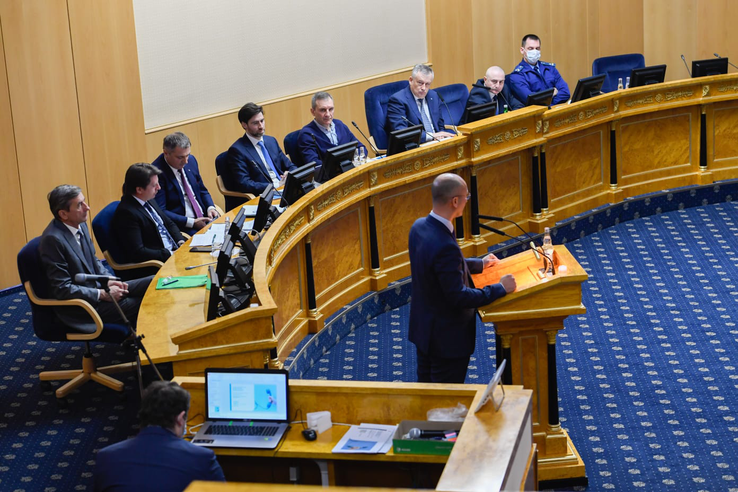
The Leningrad Region, together with the business community, has developed measures to support enterprises in the face of sanctions restrictions.
The proposals were discussed at the first meeting of the Operational Headquarters for the Sustainable Development of the Economy of the Leningrad Region.
“Thanks to your active work to develop production, increase investment, the region's economy has been developing steadily in recent years. Today the situation has changed, we are in very tough conditions of sanctions, many have already faced a break in supply chains, transport components, changes in the banking sector. The key task for us is the smooth operation of enterprises and the preservation of jobs. It is important for us to find a compromise solution with businesses with foreign capital - these are enterprises where residents of the region work. This is a business that operates on our territory, provides wages, pays taxes, forms the budget and ensures the socio-economic stability of the region. Thanks to the companies that continue to work in difficult conditions. Today, it is important for us to build an operational dialogue in order to respond in time to emerging problems,” said Alexander Drozdenko, Governor of the Leningrad Region.
Based on proposals from Russian and foreign business associations and companies, the economic bloc of the regional government has prepared a list of support measures for making proposals at the federal level and for adoption at the regional level.
Thus, at the regional level, it is proposed to subsidize the lease of commercial premises for small manufacturing businesses with the aim of import substitution. “It is small mobile enterprises that are ready to take risks and make quick decisions that can become a serious help in replacing components that have become inaccessible to the Russian industry due to sanctions restrictions or logistics,” said Deputy Prime Minister of the Leningrad Region, Chairman of the Committee for Economic Development and Investment activities of Dmitry Yalov. To do this, an inventory of such premises will be carried out and their database will be created. For import substitution projects, the region also offers an investment tax deduction. At the federal level, the business community proposes to subsidize transportation costs for critical imports, expand the list of support with concessional loans and grants for import substitution of production equipment and high-tech materials.
It was also proposed to increase the volume of IDF loans for industry for the implementation of domestic software, introduce a new type of loan for capital construction, and increase the amount of subsidies for transport costs for exporters.
For the construction industry, where today it is necessary to increase the demand for building materials, it is proposed to use the funds of the Capital Repair Fund to spend on phased repairs of buildings, change the procedure for advancing work on the overhaul of housing stock and other measures. In order to support the enterprises of the timber industry complex, the business has proposed to temporarily lift the restriction on the export of timber products - chipboard, wood chips, shavings of rough wood.
In the field of agriculture at the regional level, it was proposed to increase the period of spending the Agrostartup grants from 18 to 30 months and the Family Farmer from 24 to 36 months. At the federal level, business has formulated proposals to expand the list of subsidized machinery and equipment and increase budget financing for this, as well as proposals to postpone the stages of labeling goods.
For small and medium-sized businesses, it is proposed to expand access to financial resources, in particular, increase the volume of microfinancing and maintain preferential rates for microloans, and a number of proposals to soften the conditions for doing business were sent to the relevant ministries.
Separately, measures have been developed to support employment. At the regional level, this is the organization of public works with wages at twice the minimum wage and the expansion of the advanced training program for workers at risk of dismissal. At the federal level, it was proposed to increase the minimum unemployment benefit, the period of its payment, and reduce the period for accepting applications for grants to 10 days.
Governor of the Leningrad Region Alexander Drozdenko emphasized that in the near future all proposals would be sent to the federal level, and regional measures would be worked out in detail. Staff meetings will be held weekly.
For business in the Leningrad Region, a hotline phone is open at 8(800) 30-20-813, where you can get advice on any areas or report a problem. Detailed information about the proposed support measures will be posted on our portal.





